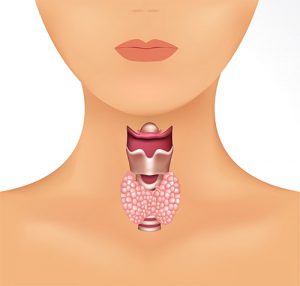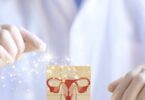Thyroid autoimmunity is a disorder of the thyroid gland in which the body itself attacks the thyroidea. The butterfly-shaped gland is located under the larynx. Its main job is to regulate energy metabolism and growth via producing iodine-containing thyroid hormones. Depending on the target of an autoimmune attack, it can result in either thyroid hyperfunction (hyperthyroidism, Grave’s disease) or hypofunction (hypothyroidism, Hashimoto). For people affected, it is important to be aware of the crucial role the two minerals iodine and selenium play in thyroid autoimmunity.

Prof Dr Duntas is a thyroid expert who enjoys a world-wide reputation. He was born in Greece and has been educated in Italy and Germany as well. The thyroid and related disorders has been his focus of research for many years. The 64-year old passes on his profound knowledge not only to his students at the University of Athens, but also in numerous articles in scientific journals.
In September 2015 he stressed in one of his publications in the journal Hormone and Metabolic Research the special function of iodine and selenium for general thyroid function and in the special situation of thyroid autoimmunity.
While an adequate supply of iodine is absolutely necessary for healthy thyroid function, the old maxim forged by famous ancient doctor Paracelsus is applicable here as well „ The dose alone makes the poison“ (Paracelsus (1493–1541).
A healthy adult needs 180-200 µg of iodine daily. This amount is usually easily reached by including sea-fish, dairy products and iodized salt in your diet.
Too much iodine is not recommended, as excess iodine (300 µg pro Tag), according to Duntas, markedly increases the risk of thyroid autoimmunity.
In sensitive persons, regular high intakes of iodine can lead to molecular alterations in thyroid cells, ultimately resulting in loss of thyroid tissue. It is for this reason that Hashimoto patients with active autoimmune processes are often recommended to avoid iodine containing drugs and iodine-rich algae (often used for sushi preparation).
Quite different is the picture when looking at selenium. Patients with thyroid hypofunction, hyperfunction, and endocrine orbitopathy often exhibit decreased selenium levels in blood. As part of so called seleno-proteins, selenium is involved in antioxidant and anti-inflammatory processes, thus indirectly protecting from advance of thyroid autoimmunity.
Prof Duntas therefore recommends regular controls of selenium levels in patients with thyroid autoimmunity. In addition to that, they should make sure to take up sufficient amounts of this trace element. It is mostly found in solid food and very rare in drinking water and other beverages. Good sources of selenium include fish, meat (esp. liver), whole grain products, sesame, milk, vegetables and particularly nuts. In order to reach the recommend nutritional reference value of 50 micrograms of selenium, you should consume 200 g fish, 350 g meat or 200 g eggs each day.
To be on the safe side, specific nutritional supplements can be an alternative (e.g. Fertilovit® FTHY). These are particularly recommendable prior to pregnancy or as a valuable support of general wellbeing during the winter months. It is not rare for patients to then require smaller drug doses, in turn reducing the risk of possible side effects.
Reference:
Duntas LH The Role of Iodine and Selenium in Autoimmune Thyroiditis. Horm Metab Res. 2015 Sep;47(10):721-6. doi: 10.1055/s-0035-1559631. Epub 2015 Sep 11.








Thank you for the article.
Great blog that I enjoyed reading.
Info effectively utilized.!